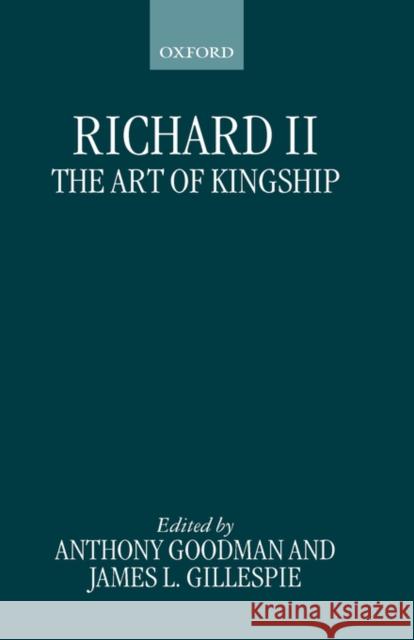Richard II: The Art of Kingship » książka
topmenu
Richard II: The Art of Kingship
ISBN-13: 9780198201892 / Angielski / Twarda / 1999 / 312 str.
Richard II: The Art of Kingship
ISBN-13: 9780198201892 / Angielski / Twarda / 1999 / 312 str.
cena 976,82 zł
(netto: 930,30 VAT: 5%)
Najniższa cena z 30 dni: 948,82 zł
(netto: 930,30 VAT: 5%)
Najniższa cena z 30 dni: 948,82 zł
Termin realizacji zamówienia:
ok. 30 dni roboczych.
ok. 30 dni roboczych.
Darmowa dostawa!
Richard II (1377-1399) was deposed and probably murdered at the end of a dramatic kingship characterized by the struggle between royal authority and the power of the great magnates of the land. Richard faced down the leaders of the Peasant Revolt of 1381 when aged only 14 but found the magnates much harder to vanquish. 1399 saw the nadir of his royal power in the Merciless Parliament. This attempt to oust power from the king seems to have spurred Richard into recovering the royal prerogative but the king went so far beyond 'good governance' that his final two years in power became known as the 'tyranny'.
The record of his reign was muddied by hostile chroniclers such as Walsingham and the anonymous monk of Evesham, and these distortions went on to be propagated by Shakespeare, leading Henry Hallam to write, in 1818, that 'the reign of Richard II is, in a constitutional light, the most interesting part of our earlier history; and it has been the most imperfectly written.' This collection of essays by leading historians aims to redress this balance and present a more accurate version of the king's 'governance'. Drawing on scholarship from both sides of the Atlantic, the re-evaluation of Richard's reign begins by deconstructing the distortions of chroniclers and the myth of the king's insanity. It goes on to examine the personal rule of the king, the role of his council and the court, and his relations with Londoners and the provinces, with the Church and the higher nobility. Other essays go beyond England's borders to look at the European perspective on trade and warfare, and on the marriage alliance between Richard and the house of Luxembourg. Finally, scholars of literature and the fine arts examine Richard's role as the chivalrous royal patron of culture. The combined result gives a rounded portrait of this fascinating and much maligned king.










